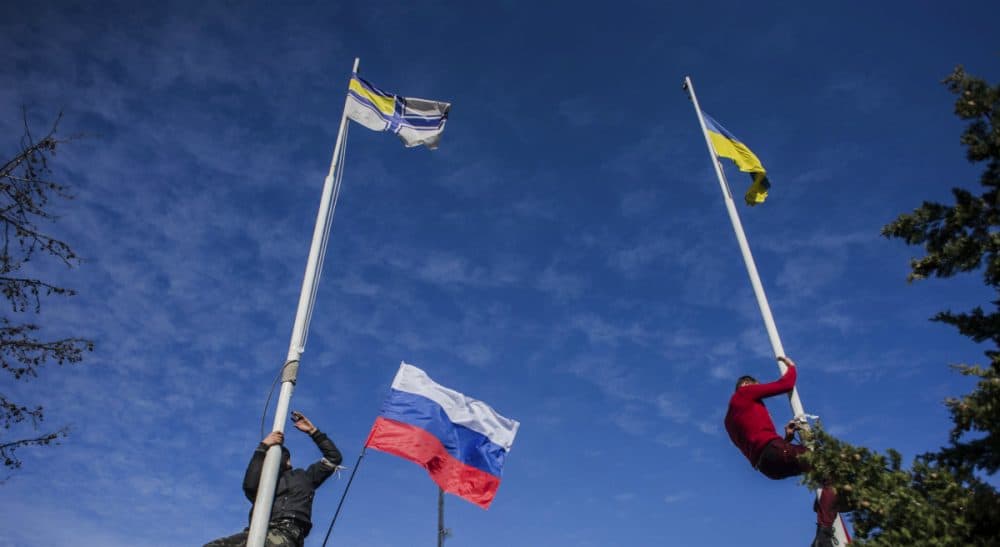Advertisement
The Ukrainian Paradox

The Ukrainian paradox is not a math problem. It has more to do with chess than equations. The short version goes something like this: the greater our ability to hurt Russia, the greater the incentive Moscow has to push back in order to deter the further imposition of costs, and thus the danger is that this will escalate in ways where both the U.S. and Russia end up losers.
This runs counter to our intuition (and the current narrative) that we must stand up to Russia and make it pay for its actions. In other words, this idea is going to take a little explaining.
Let me be clear. I detest Putin. Always have. The former KGB agent has stayed in power through a series of electoral manipulations that are doubtless admired by autocrats everywhere. No, he’s not the worst dictator ever (he’s got nothing on Stalin or even Syria’s Assad), but I’ve never liked him, and there can be no question that his invasion of Crimea violates international law, and that the recent referendum is a sham. The fact that he seems to be positioning Russia as a religiously orthodox, conservative counter-balance to the West is a troubling to say the least.
There is no doubt that Russia is the wrongdoer in this story, but acting on justified moral offense rather than clear eyed strategic interest is more likely to increase the price we all pay.
And while I have been a critic of President Obama’s foreign policy, the notion that recent events in Crimea are Obama’s fault — the consequence of "weakness" — is just sad. If only we had bombed Syria or Iran, the argument goes, none of this would have happened. Purveyors of this baloney apparently know little about history and geography and even less about strategy. No wonder a number of foreign policy hands have urged critics to cease and desist during a moment of potential crisis. (Yeah, like that’s going to happen.)
In contrast, many who actually wrestled with the Soviets during the Cold War (and more than a few of them respected scholars) have pointed out the obvious: Crimea was once part of Russia. Russia has a military base in Crimea. It is a peninsula, hanging like an over ripe pear that was easy for Russia to pluck and hold. And frankly, there are extreme nationalists and fascists that were part of the Ukrainian opposition, though Putin wildly exaggerates their importance. Russia, having been invaded by the Nazis, is especially sensitive to what happens on its borders and prefers benign buffer states that can insulate it from potential aggressors.
Finally, Russia feels like it got scammed. Contrary to its expectations following the breakup of the Soviet Union, NATO and the West have progressively pushed east to Poland and the Baltic states with the result that NATO (i.e. the perceived enemy) has come ever closer to its border. Imagine if Russia set up camp, complete with military deployments, in Mexico or the Caribbean. (Oh, wait, you mean like Cuba in 1962?)
Advertisement
It doesn’t hurt Putin that this move is popular at home. Even Putin’s critics feel the sting of an empire lost and yearn for a return to respect. Many Russians believe that Crimea is part of Russia, so the domestic politics favor Putin’s land grab, at least for now.
That enthusiasm may fade over time when the full costs are accounted for. It will have the effect of revitalizing NATO, scaring the bejesus out of countries on its periphery, insuring that the rest of Ukraine will lean West (especially now that a large pro-Russian constituency is out of the picture) and potentially create a situation where minorities in the new Crimea (Tartars and others) take up opposition. Putin’s recent speech on Crimea underlines his concern about the Tartars. And oh, by the way, the folks in South Ossetia and Abkhazia that Russia wrested away from Georgia in 2008 have not exactly prospered.
Whatever those costs, Ukraine is a vital interest to Russia, and great powers will pay high costs to defend vital interests. Strong words and weak sanctions are not going to force Russia to relent, especially when our European allies are less than excited about picking a fight. Simply put, Russia cares more about this than we do. And as long as they do not overplay their hand and march into eastern Ukraine, the status quo will hold.
Which brings us to the Ukrainian Paradox. With any luck, this will blow over the same way the 2008 war in Georgia did, that is, without irreparable harm to the U.S.-Russian relationship. After all, the day before the invasion of Crimea, how many people were talking about Russia’s far more violent annexation of parts of Georgia? How many people were lamenting the return of the Cold War? Answer: nobody.
But 2014 may not be 2008. Already there are reports that as much as $50 billion in capital has left Russia in the span of a few weeks. If the U.S., despite Euro anxiety, is actually able to impose big costs on Russia, Moscow may feel compelled to respond, even at the risk of worsening the crisis. If it does, we could see a deepening of the rift, where each side imposes penalties on the other without actually being able to achieve its policy goals. That’s lose-lose, not win-lose nor win-win.
With any luck, this will blow over the same way the 2008 war in Georgia did, that is, without irreparable harm to the U.S.-Russian relationship.
For the U.S., it could mean problems in negotiations with Iran or in resolving the Syrian chemical weapons issue. I still think this is unlikely and that cooler heads will prevail, but the irony is clear. The more we can hurt Russia, the greater the incentive they will have to respond in kind, even as they refuse to budge on what they see as a core interest.
The popular view, one part sanctimony and one part naiveté, is that we have to punish the wrongdoers. There is no doubt that Russia is the wrongdoer in this story, but acting on justified moral offense rather than clear eyed strategic interest is more likely to increase the price we all pay. In addition, it would accomplish nothing for the Ukrainians and could produce a serious crisis that neither the U.S. nor Russia is ready for.
Russia is doing enough harm to itself with its illegal invasion. Let’s step out of the way and avoid the Ukrainian Paradox, for our own sake.
Related:
